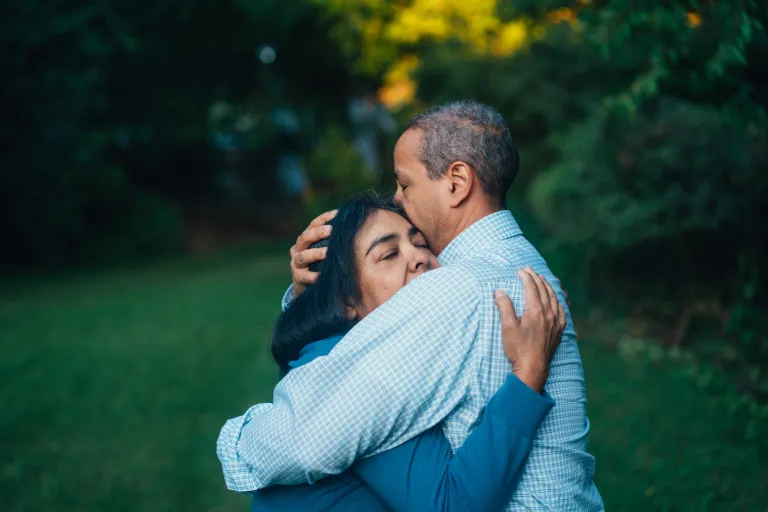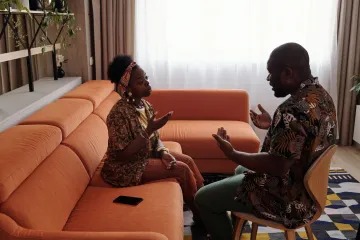
Being able to trust your partner is one of the most important aspects of a relationship. Trust will develop differently within each relationship but there are ways to ensure you’ve created a good environment for building trust and ways to avoid creating obstacles.
When we think about trust, it's often assumed that it's just about sexual fidelity but trust is much more complex than that. For many people, not having sex with someone else is the most important kind of trust and breaking it can be a deal breaker. But other types of trust around, for example, being responsible with money, always telling the truth, and doing what you say you will do are also really significant.
Setting boundaries
Agreeing clear boundaries together is a crucial part of developing trust. Boundaries help you define how much space you’re comfortable with in a relationship – emotionally and physically.
Boundaries can be about all kinds of things: how much time you need to yourself, how comfortable you are telling other people details about your relationship, whether or not you will continue to socialise on your own and so on. Having an understanding of one another’s boundaries is important when it comes negotiating your approach to the relationship.
Think about what your deal breakers would be and why they're important to you. Your partner may need to understand why you need these boundaries in place. Your experience in previous relationships or in your family will come into play here. If you and your partner have very different ideas about what constitutes a trusting relationship, you will both need to think about some of the things that you’re willing to be more flexible on.
Talk about your boundaries
As in so many aspects of a healthy relationship, it's essential to be able to talk together about your thoughts and experiences. Set aside some regular time when you’re both feeling calm and relaxed and have a conversation.
You'll probably have different views on at least some 'types' of trust and your views may change over time, as you spend more time together. Something that seemed really important at the start of a relationship, like what you each share about your relationship with close friends or family or, maybe, with an ex-partner, may not seem such a big deal after a while.
Trust, like love, can develop and deepen over time or it can be destroyed in a few short hours by particular actions or words. It can be rebuilt again, if that's what you both want and the one who has lost the trust of their partner works hard at rebuilding and demonstrating that their behaviour has changed.
Recognise what you’ve learnt before
Most of us carry positive and negative learning from previous relationships or from our families. Recognising what messages we’ve learnt and the ways in which it may be affecting our behaviour is important in avoiding making the same mistakes over and over again.
Be open about doubts
Many people feel guilty about doubting their partner in a relationship. If you do have doubts, don’t be afraid to talk to your partner about them. It's much healthier and more honest to discuss them, rather than bottle them up and hope they'll go away. Often, simply being able to say them out loud will help you understand them better or your partner's reassurance will mean they lessen or go away altogether.
When trust is compromised
Every relationship has its ups and downs and you'll upset each other from time to time. Being able to deal with problems, big or small, is an important skill when it comes to maintaining a resilient partnership. If your partner has behaved in a way that's dented your trust in them or you've similarly upset them, you may find the following tips useful:
Stop – and analyse how you’re feeling
Think about how you’re feeling in relation to what’s happened and why. Consider how these feelings may be influencing your behaviour and what you need to do to change things. Being able to find a resolution can be an important part of moving forward.
Think about your own part in what went wrong
While it can be tempting to blame our partners when there’s a disagreement or fight, we’ll usually be able to see there are things we could have done better too if we’re honest with ourselves. It’s not always easy, but try to recognise that every argument has two sides. Do you need to apologise for your part in what happened?
Talk about what happened
Take turns to communicate how you’re feeling about the issue and listen to what your partner has to say. It can be helpful to use ‘I’ phrases: ‘I feel...’, ‘I think...’, rather than ‘you’ phrases: ‘you always...’, ‘you seem to think...’. This way, you’re taking responsibility for your own thoughts and actions.
Make some changes
Think about what you might need to do differently to stop the same situation reoccurring. Discuss any possible changes together and agree on what you think would work for you both and, then, importantly, make sure you carry out whatever changes you agreed to. Being true to your word is a key part of building and maintaining trust in any relationship.
How we can help
If you’re looking for support with your relationships, we can help. We offer a range of ways to speak with a trained relationship expert including ongoing counselling, 30 minute web and phone chats, and one session therapy.
Find out which service is right for you
How you can help
Have you found this advice helpful? Make a donation to help us reach more people and continue supporting the nation’s relationships:
Can't afford to donate? We understand. Instead, we ask that you leave us a 5 star review on Trustpilot.


